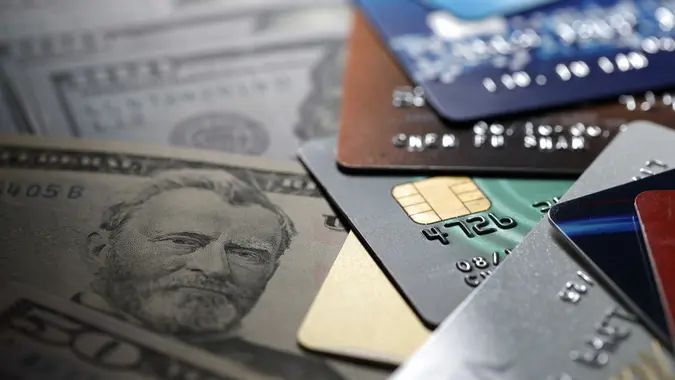6 Credit Card Debt Myths That Nobody Should Believe in 2024

Commitment to Our Readers
GOBankingRates' editorial team is committed to bringing you unbiased reviews and information. We use data-driven methodologies to evaluate financial products and services - our reviews and ratings are not influenced by advertisers. You can read more about our editorial guidelines and our products and services review methodology.

20 Years
Helping You Live Richer

Reviewed
by Experts

Trusted by
Millions of Readers
Credit card debt is a common issue. The average credit card debt among American consumers is $6,218, according to a TransUnion report. Additionally, according to the latest Federal Reserve data, the average credit card APR is 22.63%. If you know anything about how credit and debt work, you know a high balance coupled with a high rate can quickly get out of hand.
But high balances and APRs aren’t the only concerns you should have when it comes to credit card debt. And it’s vital that you separate facts from fiction.
Here are the credit card debt myths you need to know to help you manage your finances wisely.
Myth 1: Carrying a Balance Improves Your Credit Score
Dennis Shirshikov, head of growth at GoSummer and finance professor at the City University of New York, said that this is one of the most pervasive myths
“The reality is that carrying a balance does not improve your credit score and can actually harm it,” he said. “Credit scores are influenced by credit utilization, which is the percentage of your credit limit that you are using. High credit utilization can lower your score. Additionally, carrying a balance accrues interest, leading to unnecessary financial costs.”
Instead, Shirshikov said you should always pay off your credit card balance in full each month.
“This ensures you avoid interest charges and maintain a low credit utilization ratio, which positively impacts your credit score,” he explained.
Myth 2: Closing Old Credit Cards Is Good for Your Credit Score
Although you might be under the impression that closing old credit cards that no longer have any debt is beneficial for your credit, it can actually harm your credit score.
“This is because the length of your credit history accounts for a significant portion of your credit score,” Shirshikov explained. “Closing an old account reduces the average age of your credit accounts, which can negatively impact your score. Moreover, it reduces your overall available credit, potentially increasing your credit utilization ratio.”
Shirshikov recommends keeping your old credit accounts open, especially those with no annual fee.
“If you’re not using them,” he suggested, “put a small recurring charge on them and pay it off each month to keep the accounts active.”
Myth 3: Applying for Multiple Cards Within a Short Period Is OK
“While it might seem advantageous to have multiple credit cards to manage expenses and earn rewards, applying for several cards in a short span can negatively impact your credit score,” Shirshikov explained. “Each application results in a hard inquiry on your credit report, and multiple inquiries within a short period can signal to lenders that you are in financial distress or seeking to overextend your credit.”
Instead, Shirshikov recommended spacing out your credit card applications and only applying for new cards when necessary.
“Consider your credit needs carefully and plan applications strategically to minimize hard inquiries,” he said.
Myth 4: Accepting a Higher Credit Limit Is Always the Right Move
“While a higher credit limit can help with credit utilization, it can also lead to overspending if not managed carefully,” explained Shirshikov. “Accepting a higher limit might make it easier to accumulate debt that you cannot pay off, leading to high interest charges and financial stress.”
Shirshikov recommended evaluating your spending habits and financial discipline before accepting a higher credit limit.
“Ensure you have a solid budget and stick to it, using the increased limit only if it aligns with your financial goals and not as an excuse to spend more,” he said.
Myth 5: Making Minimum Payments Is Always Enough
Kelan Kline, personal finance expert and co-owner of the personal finance blog The Savvy Couple, said that, although making minimum payments might keep you in good standing, it won’t help you make headway if you’re carrying a large balance.
“The rest of the balance racks up interest, which makes it take longer to pay off the balance,” he explained.
To avoid being trapped in a cycle of perpetual credit card debt, Kline recommended paying more than the minimum whenever possible. “It’ll save you money in the long run and help you clear that debt faster,” he said.
Myth 6: Debt Relief Will Ruin Your Credit Score Forever
Emma Davidson, MBA, high-risk payment consultant with eMerchant Authority, said credit card debt relief strategies like debt settlement can impact your credit, but the effect they have is not necessarily a permanent or catastrophic effect.
“Believing this myth might prevent people from seeking help when they need it,” she said.
Davidson said you should educate yourself on the actual impacts of different debt relief options. “Consult with a financial advisor or credit counselor to understand how various strategies might affect your specific situation,” she suggested.
 Written by
Written by  Edited by
Edited by 

























